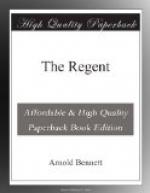III
She was sitting down in a cosy-corner, her feet on a footstool, and she seemed a negligible physical quantity as he stood in front of her. This was she who had worsted the entire judicial and police system of Chicago, who spoke pentecostal tongues, who had circled the globe, and held enthralled—so journalists computed—more than a quarter of a million of the inhabitants of Marseilles, Athens, Port Said, Candy, Calcutta, Bangkok, Hong Kong, Tokyo, Hawaii, San Francisco, Salt Lake City, Denver, Chicago, and lastly, New York! This was she!
“I understand we’re going home on the same ship!” he was saying.
She looked up at him, almost appealingly.
“You won’t see anything of me, though,” she said.
“Why not?”
“Tell me,” said she, not answering his question, “what do they say of me, really, in England? I don’t mean the newspapers. For instance, well—the Azure Society. Do you know it?”
He nodded.
“Tell me,” she repeated.
He related the episode of the telegram at the private first performance of “The Orient Pearl.”
She burst out in a torrent of irrelevant protest:
“The New York police have not treated me right. It would have cost them nothing to arrest me and let me go. But they wouldn’t. Every man in the force—you hear me, every man—has had strict orders to leave me unmolested. It seems they resent my dealings with the police in Chicago, where I brought about the dismissal of four officers, so they say. And so I’m to be boycotted in this manner! Is that argument, Mr. Machin? Tell me. You’re a man, but honestly, is it argument? Why, it’s just as mean and despicable as brute force.”
“I agree with you,” said Edward Henry, softly.
“Do they really think it will harm the militant cause? Do they really think so? No, it will only harm me. I made a mistake in tactics. I trusted—fool!—to the chivalry of the United States. I might have been arrested in a dozen cities, but I on purpose reserved my last two arrests for Chicago and New York, for the sake of the superior advertisement, you see! I never dreamt—! Now it’s too late. I am defeated! I shall just arrive in London on the hundredth day. I shall have made speeches at all the meetings. But I shall be short of one arrest. And the ten thousand pounds will be lost to the cause. The militants here—such as they are—are as disgusted as I am. But they scorn me. And are they not right? Are they not right? There should be no quarter for the vanquished.”
“Miss Joy,” said Edward Henry, “I’ve come over from London specially to see you. I want to make up the loss of that ten thousand pounds as far as I can. I’ll explain at once. I’m running a poetical play of the highest merit, called ‘The Orient Pearl,’ at my new theatre in Piccadilly Circus. If you will undertake a small part in it—a part of three words only—I’ll pay you a record salary, sixty-six pounds thirteen and four-pence a word—two hundred pounds a week!”




